The beautiful self-contained garden village of Port Sunlight was built at the end of the 19th century by Lord William Hesketh Lever as a home for 3,500 workers and their families at his soap factory, Lever Brothers, which eventually became the global giant Unilever.
He claimed that Port Sunlight was an exercise in profit sharing, but rather than share profits directly, he invested them in the village. He said, "It would not do you much good if you send it down your throats in the form of bottles of whisky, bags of sweets, or fat geese at Christmas. On the other hand, if you leave the money with me, I shall use it to provide for you everything that makes life pleasant – nice houses, comfortable homes, and healthy recreation.
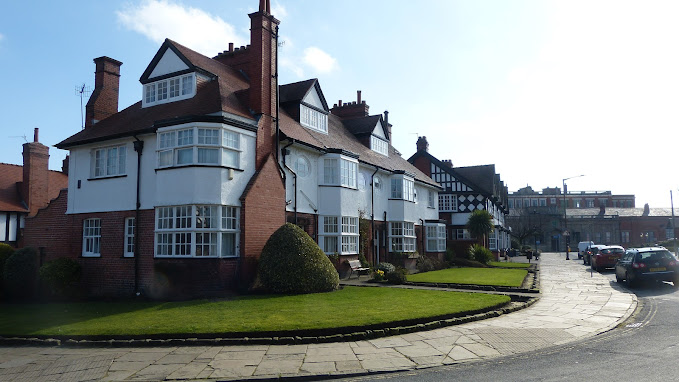
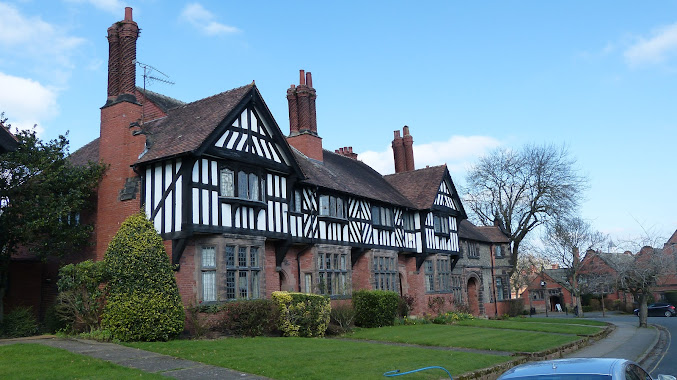
Lever engaged over 30 different
architects during the building of Port Sunlight, named after the Lever
Brothers' most popular brand of cleaning agent, Sunlight. As a result
the village is an intoxicating mix of architectural styles set within 130 acres
of beautifully maintained parks and tranquil gardens. The garden village had
allotments and public buildings including the Lady Lever Art Gallery, a cottage
hospital, schools, a concert hall, open air swimming pool, church, and a
temperance hotel. Lever introduced welfare schemes and provided for the
education and entertainment of his workforce, encouraging recreation and
organisations which promoted art, literature, science or music.
It is the finest surviving example of early urban planning the UK. 90 years after its construction the whole of Port Sunlight was declared a conservation area in 1978 with 900 Grade II Listed buildings.
Add to this some excellent public sculpture, a fascinating museum, and one of the finest and largest war memorials in the UK.
And if all that wasn’t enough the village also has Hulme Hall, a Grade II listed venue within the heart of the village. Originally intended as a women's dining room by William and Segar Owen, it later became a community centre. Today it is used for public events, the Wirral Guitar Show being just one.
In a village full of buildings steeped in historical significance Hulme Hall has the added attraction of having a Beatles’ connection. The Fab Four played at the hall on four occasions, significantly on 18 August 1962 when Ringo Starr made his debut as an official member of the group.
Their first engagement in Port Sunlight was on 7 July 1962 [1] when the Beatles performed at a Saturday night hop for the local golf club. It was their only appearance with Pete Best.
The booking had been arranged back in the early summer of 1962 by Harry Hackett. As Captain of the local Golf Club, he was responsible for organising the club’s annual dance. He chose Hulme Hall as the venue and booked The Modernaires, as the main band for the evening. Looking for a group that might fill in during the Modernaires’ break, and appeal to the younger members of the audience he asked his son Ian for suggestions.
Ian had seen The Beatles at a lunchtime session at the Cavern on 16 March and suggested his Dad book them.
Wishing to go "upmarket" and expecting a more refined audience than their usual Cavern crowd, Brian Epstein insisted that for this booking the Beatles had to wear their new suits, according to Pete Best in his book "The Best Years of The Beatles": He said we couldn't wear leathers, that it was a dinner, a black- tie job. He said 'You are not going to get the same people who normally follow you around.' It was a swish do in the village itself.[2]
As the Beatles were working out their set list for the appearance Brian offered some song suggestions. Perhaps still smarting from their failed audition for Decca Records which they no doubt partly, or completely, blamed on Brian's input on the choice on songs they had performed, they bluntly told him "No, no, we're going to do this, we're going to play what we want this time"
The group arrived in the Hall's reception area where the dinner, arranged by the local golf club, was taking place. They were surprised to see some familiar faces.
Pete Best: How they got tickets I don't know - but the fans were there! If they wanted to get to a place, they got to it. There were tables with our fans sitting there, still in their duffle jackets and polo-neck sweaters, and further down the hall are all these people in penguin suits and evening dresses.
For some reason, Pete recalls that the Beatles didn't want Brian to see the audience and tried to keep him backstage.
So they went on in their suits, the curtains went back and a scream went up from their fans.
Pete Best: Brian was saying 'What is this?' But the
funny thing is, and this took us by surprise, that the people in the penguin
suits and lounge suits and evening dresses were rowdier than our fans were.
They were the first to get on the floor, the first to run down to the stage. It
was probably one of the few occasions we played where our hardcore fans got
pushed to the back.
In Port Sunlight, as it was at
almost every venue, when the Beatles came on and started playing the audience
simply stood transfixed in front of the stage with any ideas of dancing
forgotten.
Even before the Beatles had made this first appearance at Hulme Hall, Brian Epstein was already in talks about them appearing again. On 14 June 1962 he wrote to Mr R Smith Esq following up on a telephone conversation they’d had the previous day and confirmed the Beatles' availability for Saturday 18 August 1962.
Epstein stipulated that the Beatles would perform a set lasting between 60 and a maximum of 80 minutes for a £30 fee. They would be supported by their friends the Four Jays (later known as The Fourmost).

By the time the Beatles returned to Hulme Hall the publicity photographs had been rendered obsolete.
At 11.15pm on Friday 17 August 1962, Ringo Starr finished his final set with Rory Storm and the Hurricanes at the Butlins holiday camp in Skegness.
The following morning, leaving his his caravan, his bright red stage suit and his bandmates behind he got into his Ford Zodiac and raced 180 miles back to Admiral Grove, his home in the Dingle. After shaping his hair into an approximation of a mop top and shaving off his beard as instructed (keeping the sidies) he hopped back into the Zodiac and drove to the town centre to meet his new bandmates. Following a private two-hour rehearsal in the Cavern the group made their way over to the Wirral.
On 18 August 1962, Hulme Hall saw Ringo Starr’s first official performance as a Beatle following the “sacking” of Pete Best. The venue can justifiably claim to be the first place to host the Fab Four in the line-up that within two years would be recognised the world over.
The Port Sunlight Horticultural Society’s annual show, a big happening, took place all afternoon in the smart L-shaped Hulme Hall. The first such event had been mounted a year after the war – a spray of colour in drab, austere 1946 – and this was the seventeenth. A dance always concluded the day and in 1962 the youth were being allowed to do their thing. Surrounded by floral displays the Beatles took to the stage just after 10pm. (Tune In, by Mark Lewisohn)
Things didn’t go completely smoothly. There were nerves, and tensions.
Ringo: A light-hearted side note: Neil Aspinall was really friendly with Pete Best and his family and so for a while he wouldn't set my kit up. This lasted for a few weeks, but he got over it. He was all we had he was driving the van, setting up the gear and everything, and he was a little miffed.
At least that’s how he remembered
it in Anthology, filtered through 20 years of peace and love.
In fact, Ringo was on high alert, extremely wary of Neil and expecting trouble from him. He didn’t know Aspinall very well but knew he was close to Pete and so when Ringo found Neil hadn’t set his drums up on-stage, he accused Neil of being petty and went into a loud strop.
In fact, there was a simple explanation for this, as Neil would colourfully explain: Ringo misinterpreted the situation: I didn’t know how to set up a drum kit. Pete always set up his own because he knew how he wanted it. So, when Ringo came into the band, I just let him do his own thing and he thought I was thinking ‘F*ck you’ because he’d taken over from Pete. Ringo didn’t have anyone set up his drums in Rory Storm’s group but as soon as he got with the Beatles, he was Big Time, like ‘We’ve got a road manager, he’ll do it.’ But he had no intention of telling me how to f*cking do it. (Tune In, by Mark Lewisohn).
This time around the Beatles had purposely brought their audience with them. However, there was a mass female chanting of ‘We want Pete!’ when they introduced their new drummer.
The make-up of the audience was
different for this show, as there were more young people than locals. The
problem was that the local people were angry as the young interlopers wanted to
show support for Pete Best. The Beatles never stood a chance. (Ian Hackett)
Ian Hackett: Ringo, because of the animosity in the crowd, was not enjoying the night of his debut. “I ran into a miserable-looking Ringo in the gent’s toilet during the break,” recalled Ian. “I tried to cheer him up with a smile and an optimistic comment: ‘Don’t worry about tonight. Things can only get better.’ And it was not long before they did.[3]
In spite of the audience reaction, Hackett was impressed with The Beatles that night.
As the Four Jays’ bass player Billy Hatton says, The Beatles said to us, ‘What do you think?’ I said I thought it sounded better than they’d been. It wasn’t the sound they’d had with Pete, it was different. Pete had a tendency to speed up and slow down, Ringo didn’t, and he had charisma. But we felt sorry for Pete all the same.
Original fan club secretary Roberta ‘Bobby’ Brown was thrilled to see the Beatles she loved take on a new dimension: I really liked Ringo from Day One, at Hulme Hall. As soon as he got up there, I thought he was great. He was full of personality. He wasn’t this moody James Dean-like person at the back. Pete never smiled and Ringo always smiled.
In 1976 Ringo was asked: When the four of you were on the stage that night and you were playing the first gig, in your ear did it sound like you were doing something revolutionary or something extraordinarily different?
Ringo: No. It just felt great! I didn't think it was revolutionary-- It just was a great band to be in, and it was a good time playing in that band. [6]
Of course, Brian Epstein was there, accompanied by his
secretary Beryl Adams, whom he’d invited to be his guest for the special
evening. Epstein had earlier treated Beryl to dinner at the Golden Primrose restaurant in Bebington –
where he took in what he called ‘Dutch courage’, a couple of stiff drinks to
shore himself up – before they went on to Port Sunlight to see the new Beatles
put on a show.
Beryl Adams: It was (Ringo's) first appearance with them and it was amazing to watch - half the girls were crying hysterically and half of them were happy because it was Ringo. Bob (Wooler) was very upset about it because he was very fond of Pete.
Officially the attendance
capacity of Hulme Hall was 450 but from this night on an additional 50
unofficial paying customers would be squeezed in for Beatles appearances.

6 October 1962
This was the third date, promoted by the local Horticultural Society.
Ian Hackett: I loved their treatments of ‘Twist and Shout’ and ‘Besame Mucho’. John’s harmonica in general was great, but especially on Bruce Chanel’s ‘Hey Baby’. At that stage, they weren’t playing that many original songs.
Earlier in the afternoon, around 4pm the
Beatles were in Dawson’s Music shop, Church Street, Widnes signing copies of
their first single, Love Me Do, released the previous day. This
appearance would be the first of only three official autograph signing sessions
that they would undertake in their career.
27 October 1962
This was the fourth and final date, promoted by the local Recreations Association. Police had to be called to control the crowds on Bolton Road.
Ian Hackett: Our home overlooked the Dell, a particularly lovely, landscaped part of the village, just a few yards from Hulme Hall, the Bridge Inn and the Men’s Club. While selling the Liverpool Echo outside Lever’s (factory), I was approached by one of my customers, Monty Lister, editor of the Port Sunlight News, with an offer I couldn’t refuse.
Monty recruited Hackett to assist him in his voluntary work at the local hospitals, Clatterbridge and Cleaver.
As well as editing the local paper, Lister regularly broadcast two shows Music with Monty and Sunday Spin, record request shows for the hospital radio, using discs from his own extensive collection which he would add to every week.
Lister was also in the habit of taping conversations with visiting celebrities to the Wirral for use in his programmes. Hackett remembers assisting Lister conduct interviews with Emile Ford, Billy Fury and Joe Brown. They put the shows together on tape in a studio in Lister’s home where he lived with his parents, and subsequently broadcast them over the hospital’s intercom system.
Before taking to the stage, at
8.45pm, the Beatles recorded an interview with Monty Lister. Unless you
happened to be a patient in either Cleaver or Clatterbridge hospital on 28 October
1962, it’s unlikely that you would have heard it until the publication of Mark
Lewisohn’s book The Beatles Live in 1986 which included the full 7 minutes on a
flexi record.
It is the group’s earliest surviving recorded interview, informative and amusing as one might expect – the Beatles didn’t suddenly become funny when they ‘got famous’ - and running at seven-minutes quite a decent length given the relative obscurity of the group outside of Liverpool. The Beatles had only just released their first record, Love Me Do, which they touch upon during the discussion, even quoting the catalogue number of the disc ‘Parlophone R4949’ in unison, perhaps indicating how long each had stared at the label in wonder.
Even at this early stage - literally the Fab Four as we recognise them have been so for only 9 weeks - Paul
McCartney does most of the talking and volunteers ‘John is in fact the leader
of the group’, something he was still trying to promote in January 1969, if
only to John himself.
We also hear about the Hamburg trips, Allan Williams, Tony Sheridan, their first television appearance and how the new boy Ringo is settling in. Paul pushes the myth that he and John have written a hundred songs ‘but don’t use half of them’ and John refers to a composition they will use, but not in its current recorded form, planning to revisit Please, Please Me at their next EMI session.
The most amusing parts for me are the local references – Ringo’s schools are both namechecked, John references ‘Ardmore’ his Auntie Anne’s home in Rock Ferry and Paul mentions his relatives living on Upton Road in Claughton (which I stopped at on Sunday before heading to Port Sunlight) while Ringo claims he has a friend in Birkenhead. George trumps everyone by announcing that he knows a man in Chester!
Accompanying Lister were a couple of lads from Port Sunlight Boys’ Club, Malcolm Threadgill and Peter Smethurst, who were there to put questions ‘from the teenage angle’.
MONTY: "Well it's a very great pleasure for us this evening to say hello to an up-and-coming Merseyside group, The Beatles. Now I know their names, and I'm going to try and put faces to them. Now, you're John Lennon, aren't you?"
JOHN: "Yes, that's right."
MONTY: "What do you do in the group, John?"
JOHN: "I play harmonica, rhythm guitar, and vocal. That's what they call it."
MONTY: "Harmonica, rhythm guitar, and vocal. Then, there's Paul McCartney. That's you?"
PAUL: "Yeah, that's me. Yeah."
MONTY: "And what do you do?"
PAUL: "Play bass guitar and uhh, sing? ...I think! That's what they say."
MONTY: "That's quite apart from being vocal?"
PAUL: "Well... yes, yes."
MONTY: "Then there's George Harrison."
GEORGE: "How d'you do?"
MONTY: "How d'you do? What's your job?"
GEORGE: "Uhh, lead guitar and sort of singing."
MONTY: "By playing lead guitar, does that mean that you're sort of leader of the group or are you...?"
GEORGE: "No, no. Just... Well you see, the other guitar is the rhythm. Ching, ching, ching, you see."
PAUL: "He's solo guitar, you see. John is, in fact, the leader of the group."
MONTY: "I don't know whether we caught that or not, but I hope it went in. And over in the background, here, and also in the background of the group and making alot of noise is Ringo Starr."
RINGO: "Hello."
MONTY: "You're new to the group, aren't you Ringo?"
RINGO: "Yes, umm, nine weeks now."
MONTY: "Were you in on the act when the recording was made of Love Me Do?"
RINGO: "Yes, I'm on the record. I'm on the disc."
(Giggles)
RINGO: (comic voice) "It's down on record, you know?"
MONTY: "Now, umm..."
RINGO: "I'm the drummer!"
(Laughter)
MONTY: "What's that offensive weapon you've got there? Those are your drumsticks?"
RINGO: "Well, it's umm... just a pair of sticks I found. I just bought erm, you know, cos we're going away. And I've put my name on. And it's good, you know."
MONTY: "When you say you're going away, that leads us on to another question now. Where are you going?"
RINGO: "Germany. Hamburg. For two weeks."
MONTY: "You have standing and great engagements over there, haven't you?"
RINGO: "Well, the boys have been there quite alot, you know. And I've been there with other groups, but this is the first time I've been there with the Beatles."
MONTY: "Well Paul, you tell us, how do you get in on the act in Germany?"
PAUL: "Well, it was all through an old agent."
(Laughter)
PAUL: (Chuckles) "We first went there for a fella who used to manage us, and Mr. Allan Williams of the Jacaranda Club in Liverpool. And he found the engagements so we sort of went there, and then went under our own..."
JOHN: "Steam."
PAUL: "Steam..." (Laughs)
JOHN: "...as they say."
PAUL: "As they say, afterwards, you know. And we've just been going backwards and forwards and backwards and forwards."
MONTY: (Surprised) "You're not busy at all?"
PAUL: "Well yes, actually. Yes. It's me left-leg, you know, the war."
(Laughter)
MONTY: "George, were you brought up in Liverpool?"
GEORGE: "Yes. So far, yes."
MONTY: "Whereabouts?"
GEORGE: "Well, born in Wavertree, and bred in Wavertree and Speke; where the aeroplanes are, you know."
MONTY: "Are you all Liverpool types then?"
RINGO: "Yes."
JOHN: "Uhh... types, yes."
PAUL: "Oh yeah."
RINGO: "Liverpool-typed Paul, there."
MONTY: "Now, I'm told that you were actually in the same form as young Ron Wycherley..."
RINGO: "Ronald. Yes."
MONTY: "...now Billy Fury."
RINGO: "In Saint Silas."
MONTY: "In which?"
RINGO: "Saint Silas."
JOHN: "Really?"
RINGO: "It wasn't Dingle Vale like you said in the Musical Express."
PAUL: "No, that was wrong. Saint Silas school."
MONTY: "Now I'd like to introduce a young disc jockey who helps us out with programmes at Cleaver and Clatterbridge Hospitals. His name is Malcolm Threadgill, he's 16-years old, and I'm sure he'd like to ask some questions from the teenage point of view."
MALCOLM: "Yes, thank you. I understand you've made other recordings before on a German label."
PAUL: "Yeah."
MALCOLM: "What ones were they?"
PAUL: "Well, we didn't make... First of all, we made a recording with a fella called Tony Sheridan. We were working in a club called The Top Ten Club in Hamburg. And we made a recording with him called, My Bonnie, which got to number five in the German hit parade."
JOHN: "Ach tung!"
PAUL: (Giggles) "But it didn't do a thing over here, you know. It wasn't a very good record, but the Germans must've liked it a bit, you know. And we did an instrumental which was released in France on an EP of Tony Sheridan's, which George and John wrote themselves. That wasn't released here. It got one copy. That's all, you know. It didn't do anything."
MALCOLM: "You composed P.S. I Love You and Love Me Do yourself, didn't you? Who does the composing between you?"
PAUL: "Well, it's John and I. We write the songs between us. It's, you know... We've sort of signed contracts and things to say, that now if we..."
JOHN: "It's equal shares."
PAUL: "Yeah, equal shares and royalties and things, so that really we just both write most of the stuff. George did write this instrumental, as we say. But mainly it's John and I. We've written over about a hundred songs but we don't use half of them, you know. We just happened to sort of rearrange Love Me Do and played it to the recording people, and P.S. I Love You, and uhh, they seemed to quite like it. So that's what we recorded."
MONTY:: "And that was Paul McCartney telling you all about it."
MALCOLM: "Is there any more of your own compositions you intend to record?"
JOHN: "Well, we did record another song of our own when we were down there, but it wasn't finished enough. So, you know, we'll take it back next time and see how they like it then."
(Long pause)
JOHN: (Jokingly) "Well... that's all from MY end!"
(Laughter)
MONTY: "Well thank you for asking the questions, Malcolm. Now, in closing, I would like to just ask you (and we're recording this at Hulme Hall in Port Sunlight) Did any of you come over this side before you became famous, as it were? Do you know this district?"
PAUL: "Well, we played here, uhh... I don't know what you mean by famous, you know.
(Laughter)
PAUL: "If being famous is being in the hit parade, we've been over here, we were here about two months ago. Been here twice, haven't we?"
JOHN: "I've got relations here. Rock Ferry." [4]
MONTY: "Have you?"
JOHN: "Yes. Oh, all sides of the water, you know."
PAUL: "Yeah, I've got a relation in Claughton Village, Upton Road."[5]
RINGO: (Jokingly) "I've got a friend in Birkenhead!"
(Laughter)
MONTY: "I wish I had."
GEORGE: (Jokingly) "I know a man in Chester!"
(Laughter)
MONTY: "Now, that's a very dangerous thing to say. There's a mental home there, mate. Peter Smethurst is here as well, and he looks as though he's bursting to say a question."
PETER: "Yeah well, there is just one question I'd like to ask. I'm sure it's the question everyone's asking. I'd like your impressions on your first appearance on television."
PAUL: "Well, strangely enough, we thought we were gonna be dead nervous. And everyone said, 'You suddenly when you see the cameras, you realize that there are two million people watching,' because there were two million watching that People And Places that we did... we heard afterwards. But, you know, strangely enough, it didn't come to us. We didn't think at all about that. And it was much easier doing the television than it was doing the radio. It's still nerve-wracking, but it was a bit easier than doing radio because there was a full audience for the radio broadcast."
MONTY: "Do you find it nerve-wracking doing this now?"
(Laughter)
PAUL: (Jokingly) "Yeah, yeah."
MONTY: "Anyway, we hope we've got a full audience in both hospitals, Clatterbridge and Cleaver. And over at Cleaver Hospital, a certain record on Parlophone, the top side has been requested for Eileen in Robert Cart Ward from Maddy. And, strangely enough, for Maddy from Eileen in the same ward. So perhaps the Beatles themselves would like to tell them what it's going to be?"
PAUL: "Yeah. Well, I think it's gonna be Love Me Do."
JOHN: "Parlophone R4949."
(Laughter)
PAUL: "Love Me Do."
MONTY: "And I'm sure, for them, the answer is P.S. I love you!"
PAUL: "Yeah."






Credits
Source
[1]
Coincidentally Ringo Starr’s 22nd Birthday and Jim McCartney’s 60th. I wonder if Paul made it back in time to
celebrate the milestone with his Dad?
[2] I
think Pete’s memories are confused here. By July 1962 the Beatles had all but
retired their leather outfits.
[3]
David Bedford interview with Ian Hackett in The Fab one hundred and Four
[6] Ringo with Elliot Mintz, Earth News 1976
Instagram: Beatles Liverpool Locations
Twitter: There Are Places I Remember
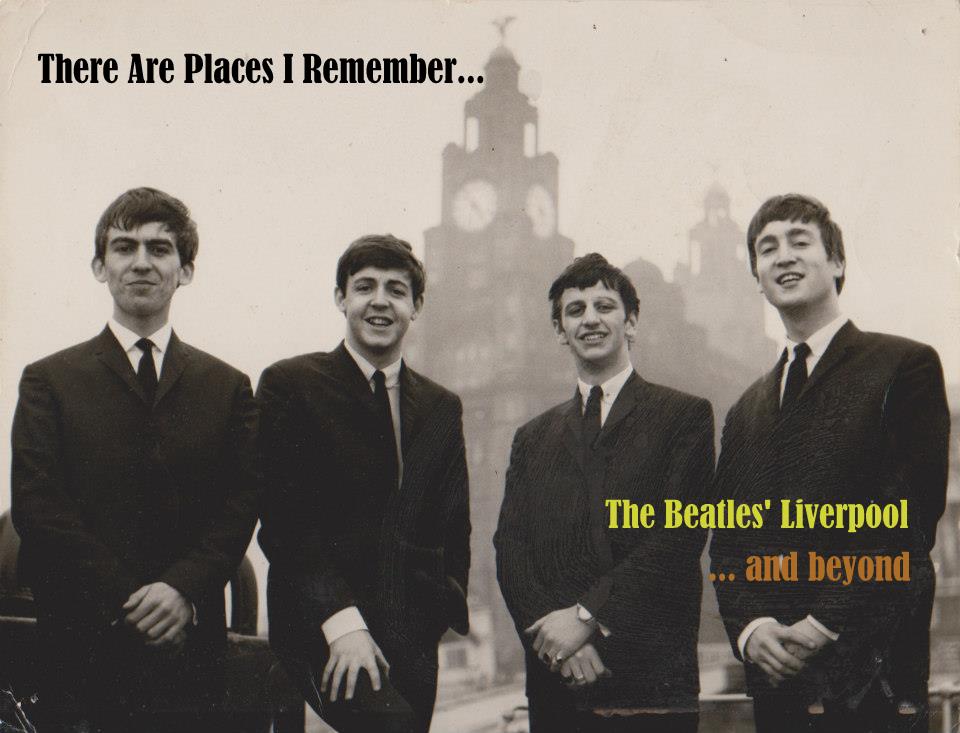


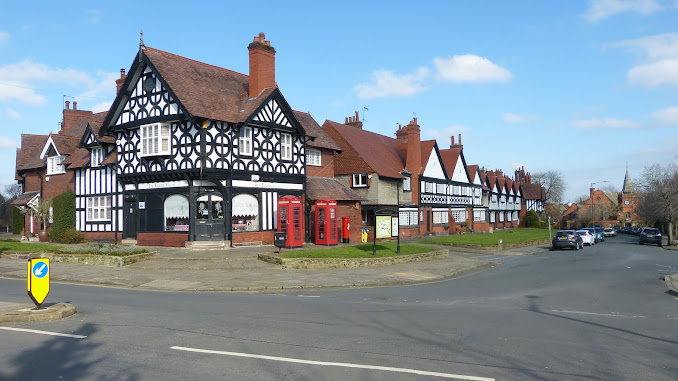


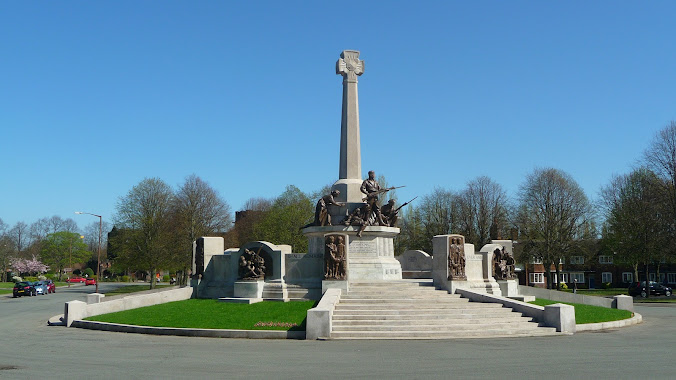



























Love this.
ReplyDelete